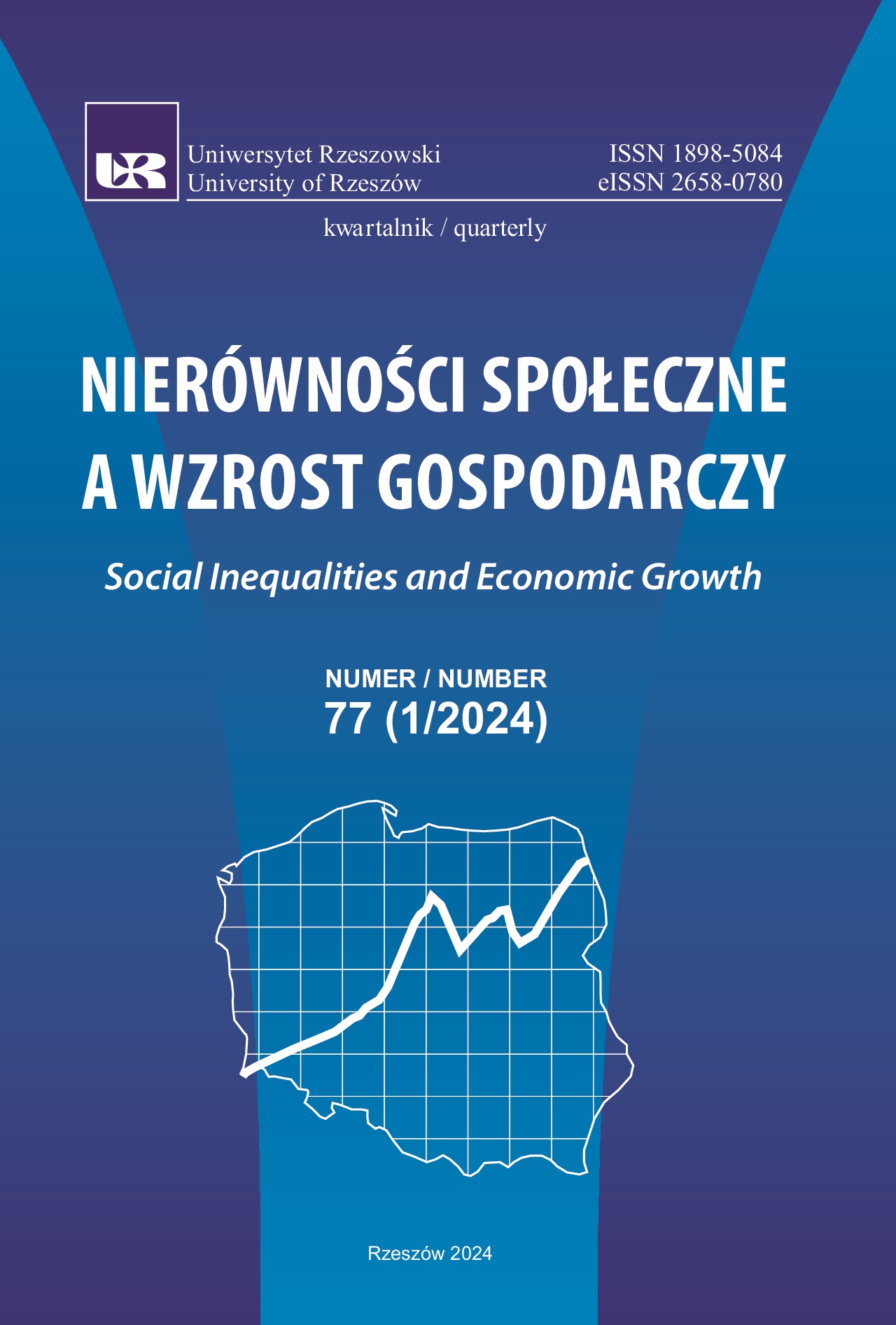Benchmarking: continuous performance improvement or an antidote to difficult times? Selected issues in knowledge and employee management in the benchmarking process
DOI:
https://doi.org/10.15584/nsawg.2024.1.8Keywords:
benchmarking, performance, knowledge management, human resource management, enterprise, tourism economyAbstract
Competing and succeeding in today’s economy requires extensive and diverse knowledge as well as external orientation, understood as the need for ongoing monitoring of the actions of market leaders, and, therefore, properly targeted human resource management. Benchmarking is a method that fits these assumptions, and, when used correctly and for justifiable reasons consistent with the company’s strategy, produces the desired results. Benchmarking is not a panacea which can prevent mistakes and failures, replacing the company’s efforts in areas such as quality or process management. Moreover, its implementation requires substantive staff preparation and managerial skills aimed at motivating and inspiring performance improvement. The article aims to identify the issues that managers encounter in the benchmarking process in knowledge and employee management. The basis of the paper is a review of relevant subject literature and a description of practices the author encountered in companies using benchmarking.
Downloads
References
Adamiec, M., Kożusznik, B. (2000). Zarządzanie zasobami ludzkimi. Kraków: Wydawnictwo Akade.
Andersen, B. (1999). Industrial Benchmarking for Competitive Advantage. Human Systems Management, 18(3), 287–296. DOI: 10.3233/HSM-1999-183-413. DOI: https://doi.org/10.3233/HSM-1999-183-413
Aniszewska, G. (1995). Benchmarking, czyli jak się uczyć i doskonalić. Marketing i Rynek, 4, 13–17.
Auluck, R. (2002). Benchmarking: A tool for facilitating organisational learning. Public Administration and Development, 22(2), 109–122. DOI: 10.1002/pad.219. DOI: https://doi.org/10.1002/pad.219
Babović, J., Raičević, V., Carić, M. (2012). Benchmarking as a function of competitiveness and efficiency in business. Economics of Agriculture, 1, 115–127.
Benchmarking – czyli uczenie się od innych (1994). Zarządzanie na Świecie, 7–8, 26–28 (artykuł na podstawie „Management Zeitschrift”).
Besterfield, D.H., Besterfield-Michna, C., Besterfield, G.H., Besterfield-Sacre, M., Urdhwareshe, H., Urdhwareshe, R. (2012). Total Quality Management. New Jersey: Prentice Hall.
Bilińska-Reformat, K. (2000). Benchmarking w przemyśle piwowarskim. Ekonomika i Organizacja Przedsiębiorstwa, 8, 21–23.
Bogan, Ch.E., English, M.J. (2006). Benchmarking jako klucz do najlepszych praktyk. Gliwice: Wyd. Helion.
Bramham, J. (2004). Benchmarking w zarządzaniu zasobami ludzkimi. Kraków: Oficyna Ekonomiczna.
Brilman, J. (2002). Nowoczesne koncepcje i metody zarządzania. Warszawa: PWE.
Camp, R.C. (1989). Benchmarking: The search for industry best practices that lead to superior performance. Milwaukee: ASQC Quality Press.
Carpinetti, L.C.R., de Melo, A.M. (2002). What to benchmark? A systematic approach and cases. Benchmarking: An International Journal, 9(3), 244–255. DOI: 10.1108/14635770210429009. DOI: https://doi.org/10.1108/14635770210429009
Czekaj, J., Dziedzic, D., Kafel, T., Martyniak, Z. (1996). Benchmarking – nowa metoda doskonalenia organizacji. Organizacja i Kierowanie, 1(83), 39–49.
Dorsch, J.J., Yasin, M.M., Mahmoud, M. (1998). A framework for benchmarking in the public sector: Literature review and directions for future research. International Journal of Public Sector Management, 11(2/3), 91–115. DOI: 10.1108/09513559810216410. DOI: https://doi.org/10.1108/09513559810216410
Fisher, R.S., White, M.A. (2000). Downsizing in a Learning Organization: Are There Hidden Costs? Academy of Management Review, t. 25, 1, 244–251. DOI: 10.5465/ amr.2000.2791613. DOI: https://doi.org/10.5465/amr.2000.2791613
Freytag, Per V., Hollensen, S. (2001). The process of benchmarking, benchlearning and benchaction. The TQM Magazine, 13(1), 25–33. DOI: 10.1108/09544780110360624. DOI: https://doi.org/10.1108/09544780110360624
Garvin, D.A. (1993). Building a Learning Organization. Harvard Business Review, 71(4), 1-15.
Hajric, E. (2018). Knowledge Management. System and Practices. Pobrane z: https://helpjuice.com/pdfs/Knowledge_Management_A_Theoretical_And_Practical_Guide_Emil_Hajric(PDF).pdf (2023.03.20).
Jakość i benchmarking w publicznym transporcie zbiorowym. (2003). Wyniki finansowane przez UE prac badawczych w dziedzinie transportu miejskiego, PORTAL – materiały dydaktyczne w zakresie transportu. Pobrane z: http://www.hosting2670473.az.pl/pliki/UE/ (2023.02.15).
Kahn, S.P. (2004). Benchmarking. Benchmarking for Continuous Improvement in Risk Management – A PERI Symposium Benchmarking, ARM Tech. Practical Risk Management, 1–7.
Karaszewski, R. (2009). Nowoczesne koncepcje zarządzania jakością. Toruń: Wyd. „Dom Organizatora”.
Kowalak, R. (2009). Benchmarking jako metoda zarządzania wspomagająca controlling przedsiębiorstwa. Wrocław: Wyd. UE Wrocław.
Kowalczyk, L. (2003). Benchmarking w zarządzaniu usługami publicznymi. Prace Naukowe AE we Wrocławiu, Zarządzanie i Marketing, 23(964), 112–122.
Koźmiński, A.K. (2004). Zarządzanie w warunkach niepewności. Warszawa: PWN.
Kuczewska, J. (2007). Europejska procedura benchmarkingu. Programy i działania. Warszawa: Wyd. PARP.
Lem, N., Price, A. (1995). Benchmarking – performance improvement toward competitive advantage. Journal of Management Engineering, 11(1), 28–37. DOI: 10.1061/ (ASCE)0742-597X(1995)11:1(28). DOI: https://doi.org/10.1061/(ASCE)0742-597X(1995)11:1(28)
Malara, Z. (2008). Przedsiębiorstwo wobec wyzwań współczesności. W: Z. Dworzecki, M. Romanowska (red.), Strategie przedsiębiorstw w otoczeniu globalnym (s. 29–37). Warszawa: Oficyna Wydawnicza SGH.
Miczyńska-Kowalska, M. (2005). Wykorzystanie nowoczesnych koncepcji zarządzania w działalności innowacyjnej przedsiębiorstwa. Prace Naukowe Akademii Ekonomicznej we Wrocławiu, 1086, 183–191.
Morgan, G. (1997). Obrazy organizacji. Warszawa: Wydawnictwo Naukowe PWN.
Penc-Pietrzak, I. (2001). Benchmarking jako metoda poszukiwania wzorcowych rozwiązań. Zeszyty Naukowe Wyższej Szkoły Zarządzania i Marketingu w Warszawie, 1(9), 5–15.
Peterson, N.J., Poulfelt, F. (2002). Knowledge Management in Action. W: A.F. Buono (red.), Developing Knowledge and Value in Management Consulting (s. 33–60). Greenwich: Bentley Collage.
Pierścionek, Z. (2003). Strategie konkurencji i rozwoju przedsiębiorstwa. Warszawa: PWN.
Simatupang, T.M., Sridharan, R. (2003). A Benchmarking Scheme for Supply Chain Collaboration. Benchmarking: An International Journal, 9(6), 9–30. DOI: 10.1108/14635770410520285. DOI: https://doi.org/10.1108/14635770410520285
Sprow, E.E. (1995). Benchmarking: sposób na nasze czasy? Problemy Jakości – Produktywność, 5, 18–24.
Strojny, M. (2000). Zarządzanie wiedzą. Ogólny zarys koncepcji. Przegląd Organizacji, 2, 12–15. DOI: https://doi.org/10.33141/po.2000.02.04
Suchorzewski, W. (2000). Benchmarking jako instrument poprawy jakości i produktywności w transporcie. Biuletyn Komunikacji Miejskiej, 54, 7–8.
Tellis G.J., Golder P.N. (1996). Pierwszy na rynku, pierwszy z rynku? Zarządzanie na Świecie, 7, 18–26.
Thompson S.H. Teo, Rohit N., Mark G., Sameer A. (2011). Leveraging collaborative technologies to build knowledge sharing culture at hp analytics. MIS Quarter Executive, 10(1), 1–15.
Walczak, W. (2013). Uwarunkowania polityki personalnej i ich wpływ na relacje międzyludzkie w organizacji. Acta Universitatis Lodziensis Folia Oeconomica, 282, 283–293.
Watson, G.H. (1993). Strategic Benchmarking: How to measure company’s performance against the world’s best. Wiley: Chichester.
Downloads
Published
How to Cite
Issue
Section
License
Copyright (c) 2024 University of Rzeszow

This work is licensed under a Creative Commons Attribution-NonCommercial-NoDerivatives 4.0 International License.


